Burning smell in VW Passat could be harmless or something very serious and a potential fire hazard. Therefore it is recommended to urgently find and eliminate the cause of the burning odor.

Burning smell in VW Passat can be caused by an engine oil leak, coolant or other fluid leak, bad blower motor or resistor, slipping serpentine belt, burning electrical components, sticking brakes, overheating AC compressor, bad alternator, bad wheel bearing, tire rubbing, or some kind of garbage like a plastic bag stuck on the exhaust pipe.
1. Oil leak
An engine oil leak can cause burning smell in VW Passat, particularly when oil drips onto the exhaust system. The surface temperature of exhaust pipe or manifold can cross 800 degrees Fahrenheit (426 °C) under normal driving behavior. Any oil leaking onto the exhaust pipe or manifold will vaporize when it gets hot under operation, causing unpleasant odor. In rare cases, you may also see smoke rising from the engine compartment.
Find the leak
Pop the hood of your Passat and investigate for any sign of oil leakage. Start by examining the valve cover, as an engine oil leak is commonly caused by a bad valve cover gasket. Also check oil filter, front crankshaft and oil pan for any leaks.
Oil spill on exhaust pipe
Did you recently get the engine oil changed in your Passat? The mechanic may have spilled some oil while pouring it into the engine that may have landed on the exhaust pipe, or there may be residual oil on the exhaust pipe from removing the oil filter. In this case the oil should completely burn off after driving for a few hundred miles and the burning smell will disappear, or you can try cleaning it with some engine cleaner/degreaser and hose it down.
2. Coolant or other fluid leak
VW Passat needs multiple type of fluids like coolant and brake fluid that are vital for the normal operation of the vehicle. Any leaking fluid that drips onto the exhaust system or hot parts of the engine will burn off and produce burning smell.
Health risks of inhaling coolant fumes
If your Passat has sweet burning smell resembling maple syrup, it indicates a leaking antifreeze. The sweet smell is coming from the ethylene glycol, a toxic chemical. If inhaled excessively, ethylene glycol increases risk of breathing difficulties, heart problems, kidney failure, brain damage and death. Therefore you must act urgently and fix any coolant leaks in your vehicle.
Inspect for leaks
Lift the hood of your Passat and inspect all the relevant components for signs of fluid leakage, including the radiator. Sometimes coolant leaking from a loose radiator cap can find its way to the exhaust system and burn off. Inspect the exhaust system for any burnt residue, you may have to lift the vehicle to have a proper look at the exhaust pipe.
Also observe the level of the coolant, if it goes down too often, there could be a leak.
Fluid spill on the exhaust system
Did you recently top up the coolant or any other fluid in your Passat? You or the mechanic may have spilled some fluid that may have landed on the exhaust pipe. In this case, the fluid should burn off completely after driving for a few hundred miles and the burning smell will disappear. The coolant should burn off pretty quickly, since its basically water.
3. Bad blower motor or resistor
If the burning smell comes from the air vents when you turn on the AC in your VW Passat, it could be due to overheating blower motor or its resistor. In rare cases, if the blower motor heats up too much, it can even melt the housing and produce burning plastic odor. You may also see white smoke coming out of the AC vents.
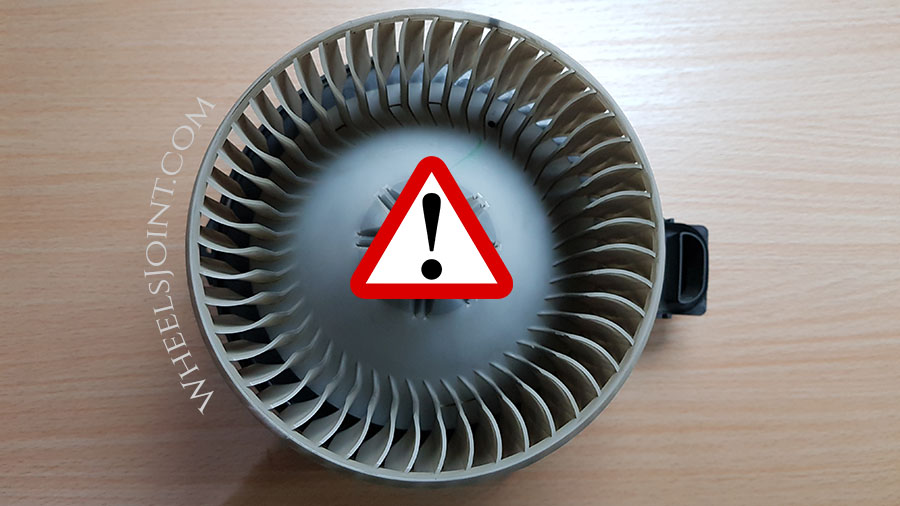
Burning smell from the engine can travel through the AC system
Before you investigate the blower motor for burning smell, you should rule out any burning odor from the engine compartment entering the AC system. The burning odor from the engine compartment of Passat can travel through the air conditioning system and make its way into the cabin even when air-circulation is enabled. This is because the air conditioning system is designed to allow up to approximately 10 percent of the air coming from the air vents to be fresh air from the outside.
Is the burning smell from the engine or the blower motor?
The easiest way to differentiate if the burning smell is coming from the engine or the blower motor is by turning on the AC fan without starting the engine.
- Turn on the ignition in your Passat when the engine is completely cold.
- Switch on the AC fan at full speed with air-circulation turned on.
- If there is burning smell, it indicates a problem with blower motor or resistor.
Inspect the blower motor
Start by investigating the blower motor, typically located behind the glove compartment and can be accessed from under the passenger side dashboard. Drop that motor in your Passat and take a look, if you’re seeing anything melted or if the blower doesn’t spin freely and easily, replace it and the resister next to it for good measure.
Recommended video
Overheating blower motor wire
In rare cases, burning smell can be caused by an overheating wire of blower motor that is drawing too much current, and its fuse is not tripping due to improper amp rating or low quality.
4. Burning electrical components
A malfunctioning electrical component or a short in a wire can cause burning smell in VW Passat. Start by inspecting the fuse box in the engine compartment and in the dashboard. Even if the fuses look normal, there could be damage from overheating hidden under the fuses. Hold your nose close to the fuse box and give a good whiff. If there is burning plastic smell, the fuse box should be removed and inspected.
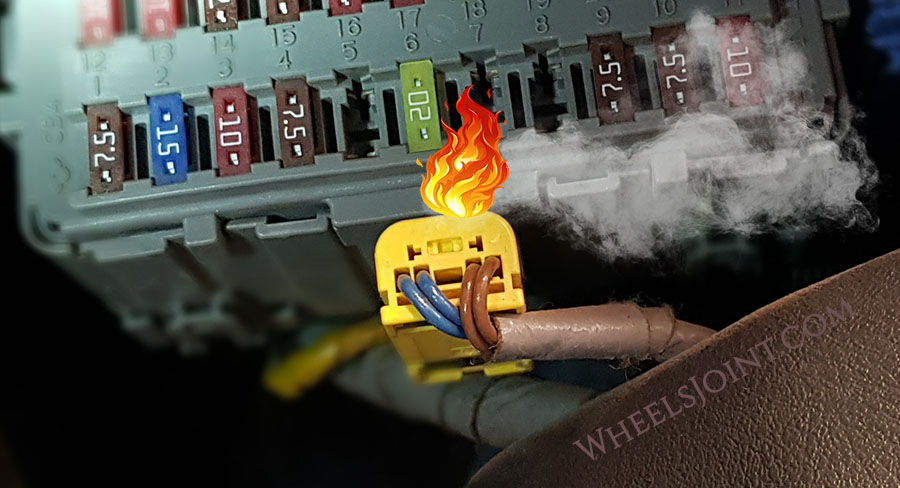
In case of an electrical short or if an electrical component (e.g. blower motor) is drawing too much current, the relevant fuse should blow. But if the installed fuse has incorrect amp rating or is of low quality, it can cause the wire to overheat and produce burning plastic odor.
5. Exhaust leak
If the burning smell in Passat resemble exhaust fumes, it could be due to a leaking exhaust manifold. The most prominent sign of a leaking exhaust manifold is loud engine noise from under the hood. You may also smell exhaust when standing over your engine compartment if the leak is large enough.
Sound of a leaking exhaust manifold
Check engine light may illuminate
The check engine light may also illuminate in your Passat in case of a leak in the exhaust manifold. The cracks can cause air to get sucked into the exhaust system. This additional oxygen is then read by the upstream oxygen sensor as a lean condition. The engine control module will then increase the amount of fuel injected into the combustion chambers. This causes poor fuel economy, but it also stresses the catalytic converter and may cause it to fail prematurely.
A leak in exhaust manifold is commonly caused by a bad gasket, but it can also be caused by cracks in the manifold itself.
Carbon monoxide poisoning risk
Exhaust gases that leak from the exhaust manifold of VW Passat have a very high concentration of carbon monoxide (CO), as they have not yet been filtered by the catalytic converter. Carbon monoxide poisoning can cause serious health problems, unconsciousness and even death. Typical symptoms of CO poisoning include blurred vision, dizziness, severe headaches, confusion, chills and nausea. So any smell of exhaust fumes in the cabin of the vehicle should be taken very seriously.
6. Sticking brakes
If the brake pads in Passat are continuously rubbing against the rotors when the brake pedal is not depressed, it will cause excessive overheating and burning smell. One of the most common cause of sticking brakes is stuck brake calipers, but can also happen due to other defects in the braking system or improper installation.
How to check for sticking brakes
Since sticking brakes cause overheating, the easiest method is to measure the temperature of the brake rotors with an infrared thermometer after a test drive. If you do not have the instrument, you can splash some water onto the rotors. If the water sizzles and evaporates instantly on contact, it means your Passat brakes are sticking. Be careful not to splash too much water, as it can damage the rotor.
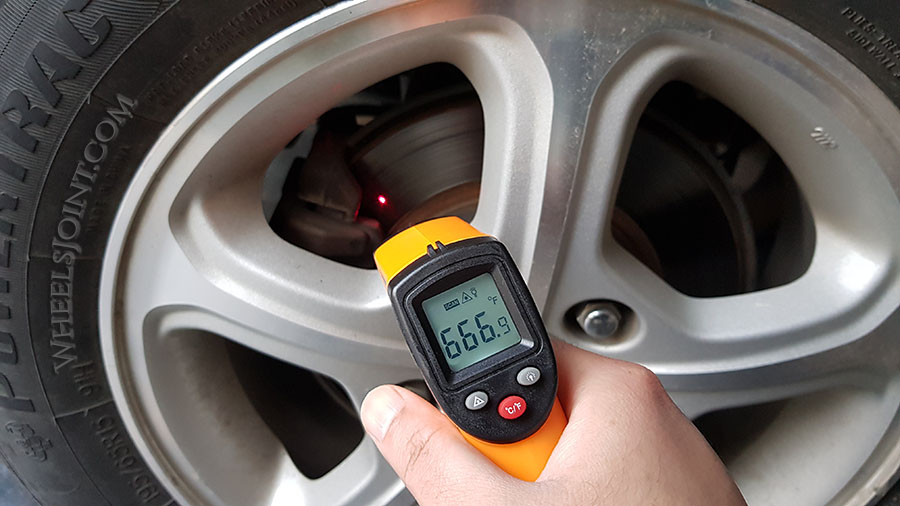
Leaking brake fluid
Sometimes, the burning smell may not be due to sticking brakes but due to brake fluid leaking onto the rotors and then burning off when you apply the brakes. A visual inspection of the brakes and checking the fluid level of the brake fluid reservoir in the engine compartment should be enough to determine if your Passat is leaking brake fluid.
Overusing brakes
Excessive usage of brakes while driving your Passat can cause burning smell due to overheating brakes. This is particularly common when driving on hilly roads. Using the brakes to slow the vehicle on a long downhill slope can cause brake overheating, can reduce brake performance, and could result in a loss of braking. To avoid this, shift the transmission to a lower gear to let the engine assist the brakes on a steep downhill slope.
Burning smell after installing new brakes
If you started noticing burning rubber smell after installing new brake pads or rotors on your VW Passat, then there may be nothing to worry about. Some brake pads are coated with special material that go through a curing process when first used, producing burning smell and in rare cases you may also see smoke. The burning smell should disappear after driving for a few hundred miles.
Burning smell in new rotors
New brake rotors have thin layer of antirust coating that will burn off during initial use if not cleaned properly before installation. The brakes may not even function optimally in your Passat until the protective coating has fully burned off.
Warped rotors
The rotors can warp due to impacts. If the surface of the disks is irregular, it can cause overheating under braking.
Use of worn brake disks and pads
When was the last time you replaced the brake pads on your Passat? Excessively worn brake pads or disks can cause overheating and give off burning smell.
7. Slipping serpentine belt
The serpentine belt, also known as accessory belt or drive belt, transfers the power from the engine to other components like the alternator and the AC compressor, that are essential for normal operation of your VW Passat. If the serpentine belt is damaged or becomes loose, or if a pulley or an accessory component in the system develops a defect, it can cause the belt to slip and the high friction will cause burning rubber smell.
The serpentine belt can also cause burning smell when its not aligned properly and is rubbing against something, e.g. the engine block.
Symptoms of bad serpentine belt
The most common sign of bad serpentine belt in Passat is squealing noise from the engine compartment. Another prominent sign is visible cracks on the ribbed part of the belt.
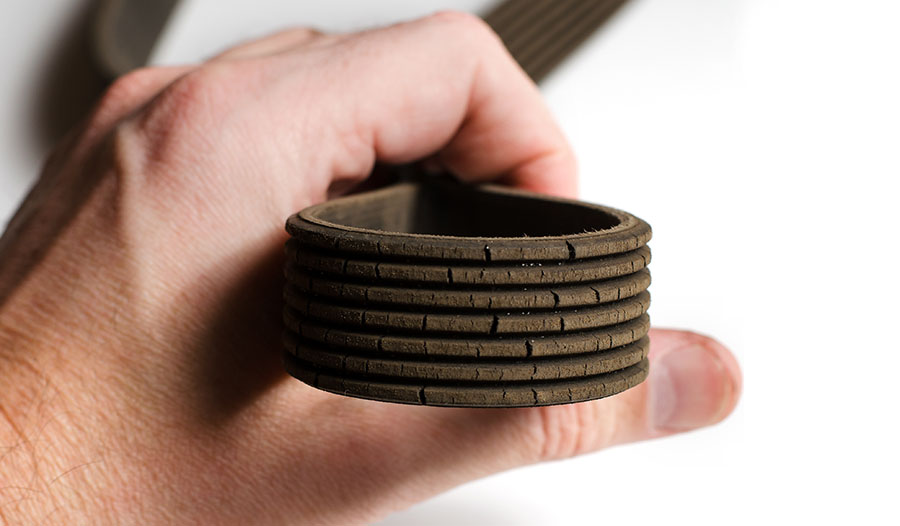
Sound of a slipping serpentine belt
If the serpentine belt is found to be defective, it must be replaced. Keep in mind that a slipping belt is not always defective, it can slip due to a number of reasons, including due to a bad tensioner pulley or any other pulley.
8. AC compressor overheating
If the compressor in your Passat has developed a defect or if there is not enough refrigerant in the AC system, the compressor will overheat and could cause burning smell. Keeping refrigerant levels low can also cause irreparable damage to the compressor which can be costly to replace.
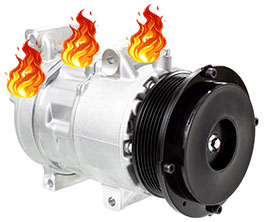
If you have an overheating compressor, it might still cool your vehicle temporarily. But if the overheating continues or gets worse, it will result in internal component degradation and the AC will stop cooling properly. So, if the air conditioning system in your Passat is not cooling and there is burning smell, it indicates a problem with the compressor.
9. Bad wheel bearing
If the burning smell is coming from a wheel well of your VW Passat, it could be due to a defective wheel bearing. When a bearing overheats, it starts to burn off its sealed lubricant which gives off strong burning grease smell.
Symptoms of a bad wheel bearing
The most common sign of a bad wheel bearing is grinding or humming noise in the cabin from the direction of the affected wheel. Sometimes other symptoms may also appear, a knocking noise when cornering, and vibrations in the steering wheel or the whole body. The faster you drive your Passat, the louder the humming noise gets.
Sound of a bad wheel bearing (humming noise)
How to check for an overheating wheel bearing
The easiest method to check for an overheating wheel bearing in Passat is to measure and compare the temperature of wheel hubs on same axle with an infrared thermometer after a test drive. If one wheel hub is way hotter than the other, it could be due to a defective wheel bearing.
10. Burning tire
A tire rubbing against the wheel well or the suspension of VW Passat will cause burning rubber smell. Another reason for burning rubber smell could be due to very poor wheel alignment causing the tires to heat up when driving at high speeds.
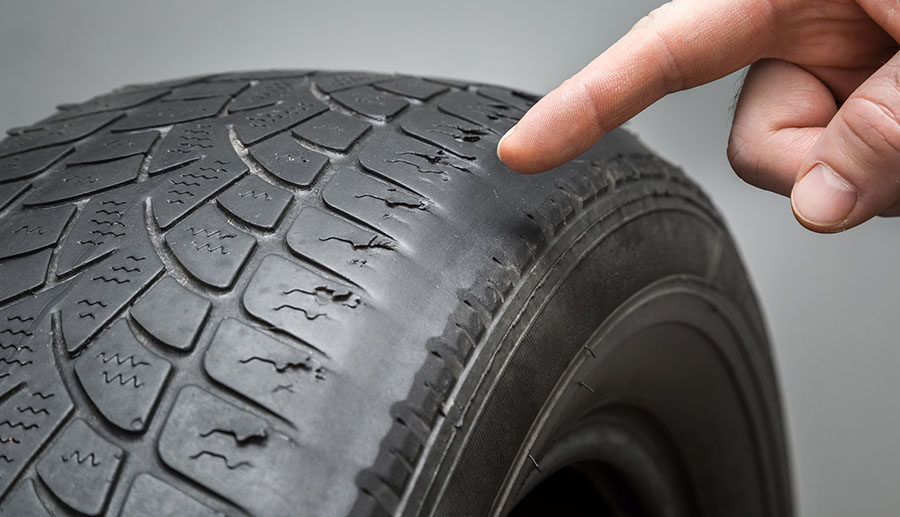
11. Bad alternator
The alternator converts mechanical energy from the engine to electricity that powers all the electrical accessories in Passat, and is also responsible for charging the battery. Since the alternator is always in operation when the engine is running, it will in some cases give off burning smell when it develops a defect and overheats.
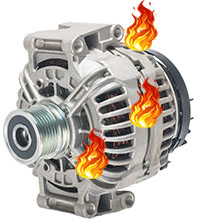
How to check for a bad alternator
The easiest way to check if the alternator is working properly in Passat is by doing voltage measurement at the battery with a digital multimeter.
- With the engine turned off, check the battery voltage.
- A fully charged battery should read over 12.5 volts. But it may be lower if the alternator is not charging properly or if the battery health is low.
- Start the engine and turn on a few electrical accessories like headlights and AC fan.
- Check the voltage at battery terminals again.
- This measurement should be anywhere from 13.7 to 14.7 volts, indicating that the alternator is working properly.
- If the voltage at the battery does not change after starting the engine, it indicates a bad alternator.
Causes of alternator failure
Alternators typically last over 100,000 miles in Passat, but they can fail earlier. Some of the causes of alternator failure are: the bearings fail, the brushes wear out, the insulation of the windings goes bad from heat (the heat could be from an external source, like an exhaust manifold, or from electrical overload), the regulator shorts out or goes open circuit, and oil contamination.
12. Bad catalytic converter
If your VW Passat smells like rotten eggs and you haven’t dropped some eggs in the cabin while doing grocery shopping, the catalytic converter may have gone bad.
The rotten eggs smell is of hydrogen sulfide which is supposed to be converted to sulfur dioxide when it passes through the catalytic converter. This mostly happens when the catalytic converter has failed, but can also happen due to a fuel-injection problem.
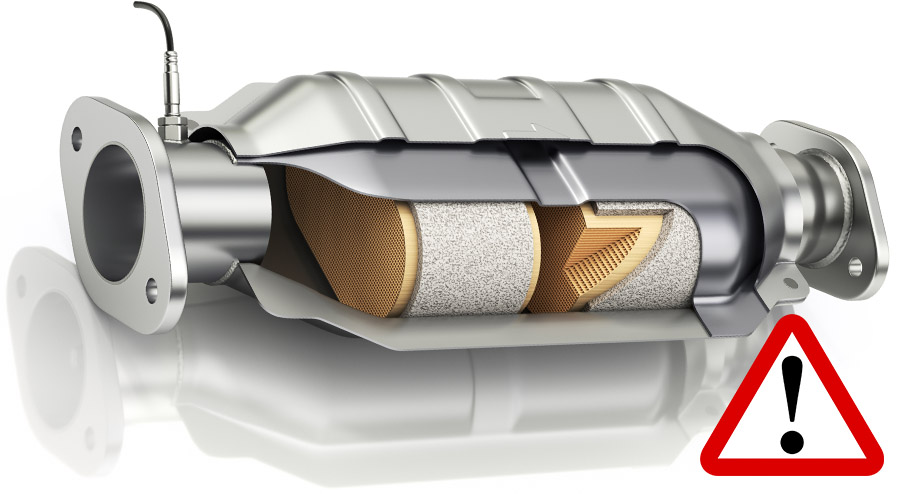
Diagnosing a bad catalytic converter
Reading out the fault codes using a diagnostic device is relatively reliable. If you see any fault code from P0420 to P0424 or from P0430 to P0434 in the OBD2 scanner, it indicates a problem with the catalytic converter. However, this is not always the case, as a bad oxygen sensor can also trigger catalytic converter codes. Therefore it is necessary to investigate the issue thoroughly before you consider replacing the very expensive catalytic converter in your Passat.
13. Rodents in engine bay
If your Passat smells like burnt barbecue and you haven’t been grilling chicken in your vehicle, then there is probably a rodent getting barbequed in the engine compartment.
The hottest exposed parts in the engine bay of Passat are of the exhaust system. Start by inspecting the exhaust manifold, you may have to remove the heat shield to have a proper look.
Rodent nest, a fire hazard
Rodents, such as rats or mice, can get under the hood and build a nest out of combustible materials like twigs, cotton, and plant materials. When the engine heats up, and if the nest is near the hot parts, the nest will start to burn and can even catch on fire which can burn down the whole vehicle. So you must always be on a lookout for rodent infestation.
Rodents inside AC system:
If your Passat AC smells like urine and feces, its possible a rodent like a mouse has made its new home in the AC ducts. This should not cause burning smell, but it can cause a very foul and hazardous smell in the cabin.
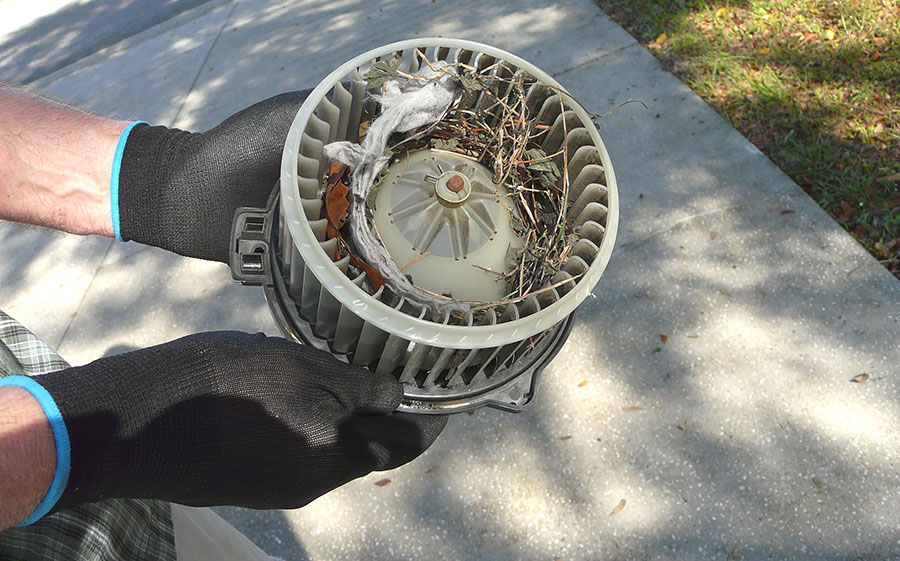
Inspect the AC system in your Passat for any signs of rodent nesting. Remove the blower motor from under the passenger side dashboard. Get yourself some safety glasses and a medical masks and look up into the ducting for any additional debris. Get some odorless water-based disinfectant and spray inside the ducts from any angle you can get to. Rodents can carry gravely serious pathogens that can go airborne from their feces (e.g. hantavirus), so you should not take a risk with this, especially if you have children in the vehicle.
14. Plastic bag stuck on the exhaust pipe
The cause of the burning smell in your Passat could be as simple as a piece of garbage, like a plastic bag, stuck on the exhaust system. Inspect the undercarriage of your vehicle for any sign of garbage, including the muffler, the exhaust pipe and the catalytic converter.
15. Burning smell in new vehicles
Burning smell in new vehicles is fairly common and generally not a cause for concern unless there is visible smoke. There are many parts (e.g. brakes, exhaust and the engine) that have protective coating on them when they roll off the factory floor. When these components heat up under normal operation for the first time, they can give off burning smell.
Typically, the protective coating burning smell subsides after driving for about 100 miles. If you can still smell something burning after 200 miles, get your vehicle checked by an authorized dealer.
Conclusion
There are many reasons why there is burning smell in your VW Passat, but there are no obvious causes, since it depends on the type and location of the smell. In some cases, the burning smell issue could be very difficult to diagnose, especially if it is caused by an electrical component inside the dashboard.
In any case, it is advisable for laypersons to visit a workshop. A professional mechanic can swiftly diagnose the issue for you.









